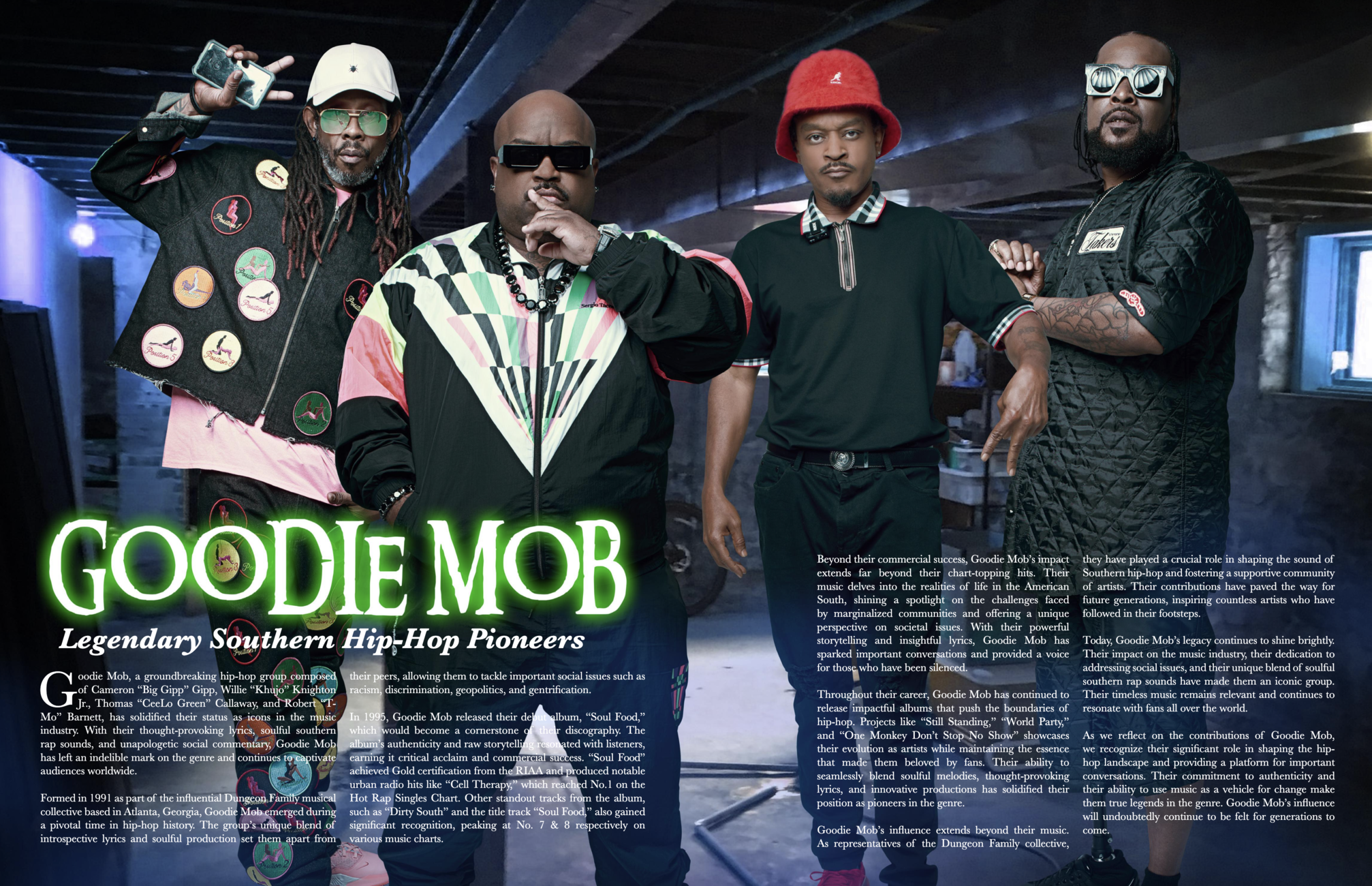

Written By: Kiara Day
When conversations around the celebration of 50 years of hip hop take place, the spotlight often lands on the boroughs of New York, the West Coast legends, or even the Midwest innovators. But for anyone who understands the cultural and spiritual foundation of southern rap, Goodie Mob holds a sacred place. They weren’t just another rap group that found success during the genre’s explosive 1990s expansion—they became the voice of a region, a conscience for the streets, and a cultural anchor for what the world would later recognize as the “Dirty South.”
Emerging from Atlanta, Georgia, Goodie Mob formed in the early 1990s and quickly became part of the Dungeon Family collective alongside OutKast, Organized Noize, and other visionaries. While OutKast helped popularize Southern rap globally with futuristic sounds and eclectic lyricism, Goodie Mob offered something different—gritty social commentary, southern spiritualism, and unapologetic truth. Their music didn’t just ask you to nod your head, it asked you to think, to feel, to take pride in where you came from.

The group—CeeLo Green, Big Gipp, Khujo, and T-Mo—came together under a shared vision of making music that would represent their community and tell the world about the challenges, hopes, and realities of Black life in the South. Their very name, Goodie Mob, stood for “the good die mostly over bullshit,” a stark reminder of the systemic struggles and everyday battles their community faced. That honesty resonated far beyond Atlanta’s streets; it gave them a global platform.
Their 1995 debut album, Soul Food, is considered a masterpiece not just in southern rap but in hip hop overall. Produced by Organized Noize, the project was a landmark in creating what would become the “Southern sound.” Live instrumentation blended with heavy basslines and gospel-infused melodies set the backdrop for raw, poetic storytelling. Songs like “Cell Therapy” became prophetic anthems, addressing government surveillance, inequality, and the paranoia felt by Black communities. Even decades later, that track feels eerily relevant, cementing Goodie Mob’s reputation as not just artists but cultural prophets.
What set Goodie Mob apart was their ability to be simultaneously political, spiritual, and streetwise. They spoke about poverty, racism, incarceration, and police brutality with a rawness that wasn’t common in mainstream rap at the time. But alongside the grit was a deep sense of pride, uplift, and encouragement. They emphasized unity, faith, and resilience—concepts often left out of the more commercial narratives dominating hip hop. Soul Food wasn’t just music; it was nourishment for the mind and soul, a reflection of its title.


As the years went on, Goodie Mob continued to define the Atlanta sound and Southern identity in hip hop. Their follow-up projects like Still Standing (1998) and World Party (1999) expanded their reach, though the group faced challenges with shifting industry trends and creative differences. CeeLo eventually stepped away to pursue solo success, while the remaining members carried the torch. Yet the group’s bond and purpose never fully dissolved, and their reunions over the years always reminded fans of the fire that made them iconic.
Goodie Mob’s legacy is deeply intertwined with the rise of Atlanta as the capital of hip hop. Long before the city was crowned the epicenter of rap’s mainstream dominance, Goodie Mob and their Dungeon Family peers were laying the groundwork. They opened doors for future generations of Atlanta artists like T.I., Ludacris, Gucci Mane, Jeezy, Future, Migos, and so many others who would carry the city’s sound into new eras. Without Goodie Mob, there would be no blueprint for the authenticity and rawness that defines Atlanta hip hop.
When celebrating 50 years of hip hop, it’s essential to remember that the genre’s strength comes from its diversity. Every region contributed something unique: New York with its lyrical foundations, Los Angeles with its G-funk and gangsta rap, Chicago with its drill movement, Houston with chopped and screwed, and Atlanta with its soulful southern storytelling. Goodie Mob’s contribution sits at the heart of that southern story. They didn’t just rap about parties or hustling; they rapped about survival, resilience, and faith. They gave the South a voice that was unapologetically conscious and proud.


What makes Goodie Mob even more important in this milestone celebration is their staying power. Unlike many acts that faded into nostalgia, Goodie Mob has remained relevant, whether through solo success, group reunions, or cultural recognition. Their impact echoes in the way southern artists approach music today—with honesty, creativity, and a refusal to conform to outside standards. CeeLo’s later mainstream stardom, Big Gipp’s collaborations, and Khujo and T-Mo’s continued contributions all highlight the individual and collective legacy of the group.
Goodie Mob’s influence also extended into broader culture. Their themes of empowerment and self-determination aligned with larger movements for justice and equality. They were never afraid to challenge the industry, the government, or even their own listeners. At a time when hip hop was often criticized for being too materialistic or violent, Goodie Mob represented balance—a reminder that hip hop could be both entertainment and enlightenment.
Today, as we honor 50 years of hip hop, Goodie Mob stands as a testament to the genre’s depth and diversity. They embody the idea that hip hop is not just about beats and rhymes but about community, storytelling, and truth. Their music reminds us that hip hop can be a tool for resistance, a source of pride, and a reflection of lived reality. For Atlanta, they are more than a group—they are cultural architects. For hip hop as a whole, they are proof that southern voices not only belong in the conversation but lead it.
Looking back at their career, from Soul Food to their more recent projects, what remains constant is the sense of purpose in their work. They’ve never strayed from their mission of representing the South authentically and giving a platform to the struggles and triumphs of Black communities. That’s what makes them timeless. In celebrating half a century of hip hop, honoring Goodie Mob means honoring the South’s spirit, its resilience, and its undeniable role in shaping the culture.
The story of hip hop cannot be told without Goodie Mob. They were pioneers of the Dirty South before it was embraced by the mainstream, they were prophets warning of systemic injustice long before it was widely acknowledged, and they were poets who captured the soul of their city and their people. As we reflect on 50 years, their legacy shines as bright as ever—a reminder that hip hop’s power lies not just in the charts, but in its ability to tell the truth, inspire hope, and move communities forward.

ATL+ is your must-read magazine for all the latest news and pop culture. Since August 2020, we’ve provided readers a chance to read about topics that interest them the most. From tourism to politics, our articles were written by a talented team of writers to help you stay in the loop about the latest trends and news.
